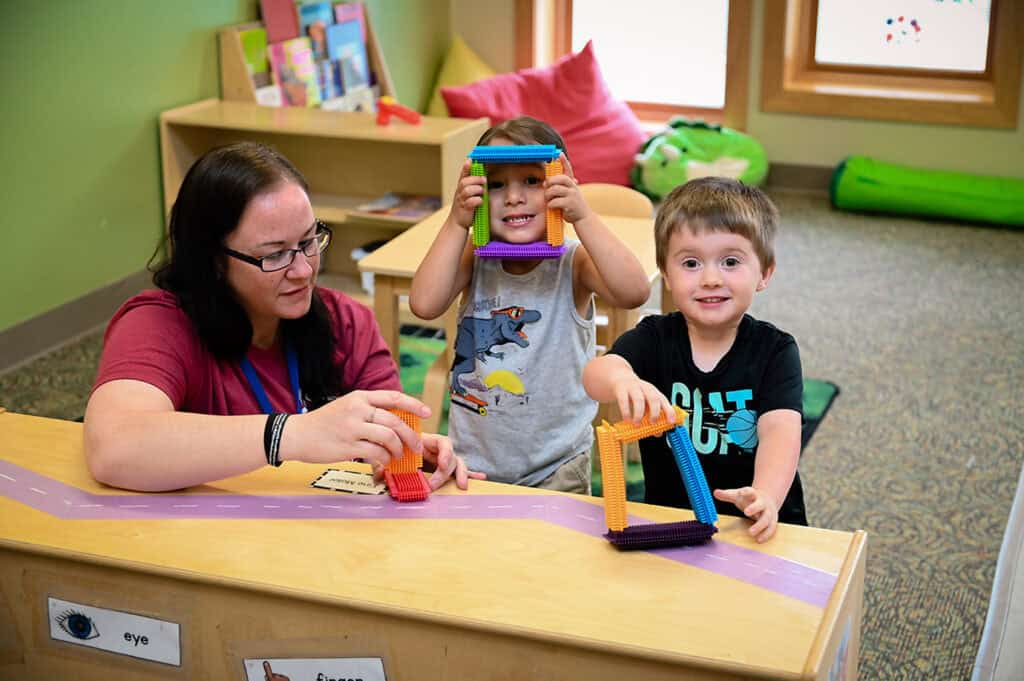Sometimes our purpose, whether personal or professional, is evident early on – at inception, even. Other times, we find our purpose through experiences. Occasionally, we find it through intentional reflection and process-driven work. Probably more often, it’s a mix of the above.
This was the case at the Early Learning Center at Gateway in Omaha, where – amidst the pandemic and an ongoing nationwide workforce crisis – staff decided to dig deep and reflect on their purpose as early childhood educators, taking a critical step in building a path toward the future of their team, their school and their community.
Personal Purpose
Some might question the wisdom of asking early childhood education (ECE) professionals to consider their purpose or motivation while schools and child care centers are already embroiled in a national workforce crisis. But Diana Svehla, school director at the ELC at Gateway, sees the situation quite differently. For her, ECE professionals knowing their purpose or “why” has always been part of the work, thus the idea of putting purpose first (before addressing staffing growth) only made logical sense.
This perspective may have been informed by her experience, growing up with a passionate mother who was an educator and professor in Mexico. Or perhaps it was informed by her first mentor at Educare Omaha, who taught her to know her purpose in all things.
Either way, this path of examining the reason behind the work we do in the ECE field, and how we bring ourselves to that work, is critically important. This reflection should not be secondary, but instead frame our discussions about staff fit, professional development, agency needs and more.
So, as we find ourselves partway through another school year: do you know your purpose? What’s your “why?” If you’re uncertain, maybe it’s time for all of us to have the conversation that ELC at Gateway started long ago.
Mission-Driven Purpose
At the ELC at Gateway, knowing the “why” frames the energy driving the work they do and powers the intentionality and quality of service. And for their energetic new school director, knowing your purpose is just the beginning of serving communities to the best of your ability.
As Diana articulated, individuals and programs alike must understand their reasons for being ever present. This includes examining what drives continued improvement. As programs continue to struggle with staffing classrooms, quality and purpose should not be sacrificed.
In this mission, to preserve quality and vision, the ELC at Gateway embraced a practice of reflection that required all staff to consider their purpose. By doing so, they emphasized people and a shared vision across the team. They rooted themselves in the idea that awareness of purpose could be used as a foundational tool for growth and support.
Bringing the Pieces Together
We must each know our own “why” – but an institution must hold strong to that purpose, even as individual opinions change. The workplace or field that comes together under a shared message or goal is surely stronger, bolstered by individuals whose passion matches the purpose of their agency. This is where the ELC at Gateway saw an opportunity: to lead by following others, as they collectively reflect on their purpose.
This is the third blog in an ongoing series providing updates on Early Head Start Child Care Partnerships (EHS-CCP) – federally funded, locally-run programs that bring together the best of Early Head Start and child care through a layering of funding to provide comprehensive and continuous early childhood development and family engagement services to infants, toddlers and their families. Currently, 13 Educare organizations in 12 states and the District of Columbia administer EHS-CCP grants.
About the Author
Andrew Bourassa is a Program Support Specialist for Kennebec Valley Community Action Program (KVCAP) and a member of the Educare Learning Network EHS-CCP Community of Practice (CoP). The vision of this CoP is to build a community of Network leaders who gain support from one another, share ideas, collaborate on professional development initiatives, and inform the early childhood field through advocacy and policy change. The CoP’s goal is to continue fostering relationships throughout the Network and build on existing connections and structures to assure ongoing communication is effectively supported.
